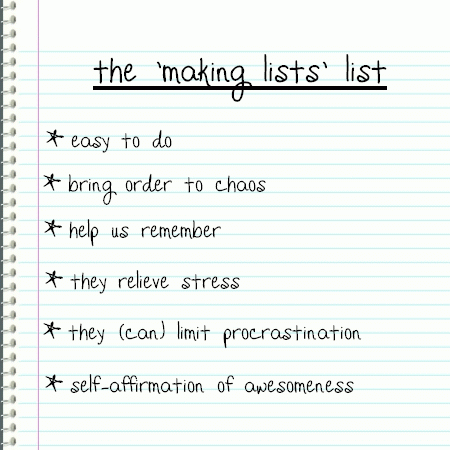To List or Not: My Life as an Obsessive Lister
Those who know me are familiar with my obsessive list making. Every day I make lists that are long, unwieldy, and unlikely to be completed. It is part of my mania that I separate these lists into three categories: fun items, daily teaching/writing tasks, and ongoing writing projects. I listed the fun items first on purpose because these are the most likely to be completed. Sometimes I do actually finish the daily teaching/writing tasks. If not, they roll over to the next day. The ongoing writing projects are generally tasks that I have been working on since time immemorial, and I am not I will ever finish most of them. They too are moved from list to list obsessively until I finally remove them because I can no longer be so masochistic.
Andrei Codrescu, in a 1989 collection of his "All Things Considered" essays, Raised By Puppets, Only To Be Killed By Research, writes about lists in a tellingly accurate, yet humorous essay, "Today We List, Tomorrow We Fail." He challenges list-makers to "see if you can go three days without a list. A week. A month. A year. If you can go a year without a list, congratulations! You will notice improvements in your memory. You will remember the things you have to make lists of today, including maybe what it is you're doing on this planet" (51).
Perhaps, this is true. If obsessive list creators can stop making lists, perhaps our memories will be better. Or, perhaps, we might just disappear because I do not think we can separate ourselves from our list creation. I would possibly never get anything done. Or I might focus on one task obsessively. I highly doubt I would have a better memory.
Codrescu's friend, Bandido, is seemingly waging a one-man war against the list, which is part and parcel of all that we do. It makes me wonder what he might think of the listicles, which now plague us on social media. Bandido believes that humans eventually will be able to do nothing but make lists. Codrescu, like me, thinks it might be a good proposition to get rid of lists, but he knows that it is in our nature not to. He concludes his essay with his response to his friend: "I thanked Bandido and made a list of his warnings to use in his essay" (52).
As list-making animals, we may never give it up. I do not think that humans will be doomed to only listing in some near dystopian future, yet we should possibly find ways to use our list-making that better our lives, instead of falling into harmful list-making processes like those I use that always end up reminding me of those tasks I cannot complete. The fun tasks serve as a reward, the proverbial carrot on a stick, but, perhaps, they should be my ultimate goal, and I should relinquish the longer tasks to the dustbin of history, or just break them into easier manageable ones. I have not figured it out yet, but I think, taking a cue from Codrescu, I might make a list to determine how.
Andrei Codrescu, in a 1989 collection of his "All Things Considered" essays, Raised By Puppets, Only To Be Killed By Research, writes about lists in a tellingly accurate, yet humorous essay, "Today We List, Tomorrow We Fail." He challenges list-makers to "see if you can go three days without a list. A week. A month. A year. If you can go a year without a list, congratulations! You will notice improvements in your memory. You will remember the things you have to make lists of today, including maybe what it is you're doing on this planet" (51).
Perhaps, this is true. If obsessive list creators can stop making lists, perhaps our memories will be better. Or, perhaps, we might just disappear because I do not think we can separate ourselves from our list creation. I would possibly never get anything done. Or I might focus on one task obsessively. I highly doubt I would have a better memory.
Codrescu's friend, Bandido, is seemingly waging a one-man war against the list, which is part and parcel of all that we do. It makes me wonder what he might think of the listicles, which now plague us on social media. Bandido believes that humans eventually will be able to do nothing but make lists. Codrescu, like me, thinks it might be a good proposition to get rid of lists, but he knows that it is in our nature not to. He concludes his essay with his response to his friend: "I thanked Bandido and made a list of his warnings to use in his essay" (52).
As list-making animals, we may never give it up. I do not think that humans will be doomed to only listing in some near dystopian future, yet we should possibly find ways to use our list-making that better our lives, instead of falling into harmful list-making processes like those I use that always end up reminding me of those tasks I cannot complete. The fun tasks serve as a reward, the proverbial carrot on a stick, but, perhaps, they should be my ultimate goal, and I should relinquish the longer tasks to the dustbin of history, or just break them into easier manageable ones. I have not figured it out yet, but I think, taking a cue from Codrescu, I might make a list to determine how.






Comments
Post a Comment